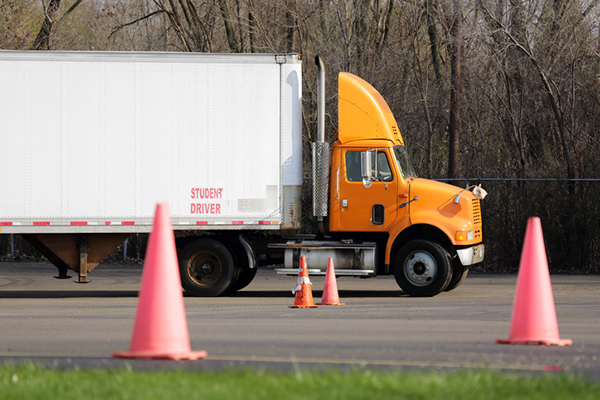FMCSA nominee promises “closer eye” on unsafe truckers
The nation’s top trucking regulator-to-be told lawmakers she is committed to taking concrete steps to reduce deaths and injuries from large-truck crashes.
Meeri Joshi said the Federal Motor Carrier Safety Administration (FMCSA) is investigating how to strengthen its new entrant program and expand the scope of motor carrier investigations to target more at-risk behavior by the nation’s 3.5 million long-haul truckers.
“Motor carriers that have risky behavior need to be investigated, and when they come into the industry we need to have a closer eye on them,” Joshi said at the nomination hearing to make her the seventh administrator of the Department of Transportation agency established in 2000 and charged with truck safety issues.
Joshi, currently the agency’s deputy administrator, was pressed by Sen. Ed Markey, D-Mass., about what he considers a lack of oversight by FMCSA in addressing heavy truck crashes.
Prior to being tabbed for the top spot at FMCSA, Joshi served as general manager of the New York office of Sam Schwartz Transportation Consultants and visiting scholar at NYU’s Rudin Center for Transportation Policy.
Joshi would succeed Raymond Martinez to become FMCSA administrator. The FY 2022 FMCSA budget request is $675.8 million, compared with $794.2 million in fiscal year 2017, the first year of the Trump administration. Those figures include funding for operations and grants to advance commercial motor vehicle safety throughout the nation covering at least 561,000 registered motor carriers and 5 million commercial drivers.
On its website, FMCSA claims since it was established as a separate agency within the Department of Transportation in 2000, the number of lives lost in large truck and bus-related crashes has decreased 26 percent.
But it acknowledges that although these numbers represent significant progress, more than 4,000 people die each year in crashes involving large trucks and buses. Those fatalities have generally increased annually since 2009.
The trucking industry has been under fire recently by some national media for operating an unsafe industry. The industry cites more trucks on the road as partly the reason fatalities have risen.
The following statistics were compiled by Policy Advice, an insurance industry web site that tracks on-highway accidents and fatalities:
- There has been a 52% increase in heavy trucks accidents since 2009;
- 74% of all fatal passenger vehicle cases include a large truck;
- Tire defects account for around 30% (the most common cause) of all truck-related accidents;
- Most of these accidents occur during the day — between noon and 3 p.m., up to 19% in the past decade; and
- 68% of all truck fatalities are passenger vehicle occupants.
In a recent “Inside Edition” news feature edition on NBC, the trucking industry was portrayed in a harsh light. The segment claimed that there are 5,500 truck-related accidents every day, some severe. It claimed that trucking accidents “obliterate everything in their path,” and interviewed families who lost loved ones in truck accidents.
“I think it’s clear that this entire industry fell into a regulatory black hole, where it escaped the level of scrutiny which it absolutely has to have if public safety is going to be protected,” Sen. Markey told Joshi during testimony before the Senate Commerce Committee.
Markey cited statistics showing deaths resulting from large-truck crashes had increased by 45% since 2009, with injuries increasing 18%. Markey seemed to get much of his data from an 11-month investigative series on truck crashes by The Boston Globe that won a Pulitzer Prize.
“Unfortunately, the response I received back from the Trump administration was woefully insufficient,” Markey said. “It failed to commit to the major reforms we need, and showed how our truck safety regulators have been asleep at the wheel.”
Joshi, whom Biden named deputy administrator in January, told the committee that, if confirmed, she would oversee several “priority items” to address the issue.
“It’s an interstate industry, and the licensing data around those that drive large trucks must also function in an interstate manner. That means there needs to be swift transfer of current data between states around CDL licensing,” Joshi said.
FMCSA would also require states to downgrade licenses if there’s a positive test in the FMCSA’s Drug and Alcohol Clearinghouse. “That’ another important enforcement tool to get risky drivers off the roads,” she said.
The FMCSA says it is guided by three core safety principles:
- Raise the bar to enter the motor carrier industry.
- Require high safety standards to remain in the industry.
- Remove high-risk carriers and drivers from our roadways.
As for West Coast port congestion, Joshi said financial incentives must be aligned throughout the supply chain.
“There are so many moving parts at the port, in order to make the trucking experience of moving freight in and out as efficiently as possible, there has to be transparency on appointment systems, flexible hours and more certainty on when containers need to be dropped off and picked up, as well as aligning the financial incentives,” she said.
“If the trucking community is bearing the brunt of wait times and that time is not compensated, either because they have to hold containers or because drivers have to wait for loading and unloading, then the congestion and the downtime is felt by them, and there’s no incentive to disperse that among the whole system,” Joshi added.
“I think it’s high time to try to change things and look at them (inefficiencies) differently,” Joshi concluded.













